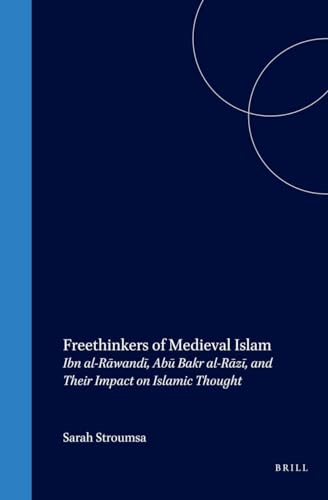Items related to Freethinkers of Medieval Islam: Ibn Al-Rawandi, Abu...
Freethinkers of Medieval Islam: Ibn Al-Rawandi, Abu Bakr Al-Razi and Their Impact on Islamic Thought (Islamic Philosophy, Theology, & Science) - Hardcover

Synopsis
This book endeavors to identify and define the phenomenon of freethinking in medieval Islam, in particular as exemplified in the figures of the two most notorious intellectual heretics, Ibn al-Rāwandī (9th C.) and Abū Bakr al-Rāzī (10th C.).
The development of Islamic freethinking is analyzed on the background of the paramount importance of prophetology in Islam. The book examines the image of the freethinkers in Islam and its connection to the legacy of late antiquity, and to the traditions about Indian and Sabian religions. The last chapters examine repercussions of his phenomenon in various aspects of Muslim, Jewish and Christian medieval thought.
It is argued that, despite its rare occurrence, freethinking was in fact a pivotal Islamic phenomenon, which had a major impact on the development of Islamic thought.
"synopsis" may belong to another edition of this title.
About the Author
Sarah Stroumsa, Ph.D. (1984), Hebrew University of Jerusalem, where she is currently a professor of Arabic and Jewish thought. She has published extensively on medieval intellectual history in Arabic, especially on Judeo-Arabic thought, including, most recently, The Beginnings of the Maimonidean Controversy in the East (Jerusalem, 1999).
Review
'Ces deux précieux volumes devront se trouver dans toutes les bibliothèques de recherche sur l'histoire générale de la pensée tant islamique qu'européenne.'
Mohammed Arkoun, Arabica, 2000.
"About this title" may belong to another edition of this title.
- PublisherBrill Academic Pub
- Publication date1999
- ISBN 10 9004113746
- ISBN 13 9789004113749
- BindingHardcover
- LanguageEnglish
- Number of pages261
- Rating
Buy New
Learn more about this copy
Shipping:
US$ 48.25
From France to U.S.A.
Top Search Results from the AbeBooks Marketplace
Freethinkers of Medieval Islam: Ibn Al-Rawandi, Abu Bakr Al-Razi and Their Impact on Islamic Thought
Seller: ECOSPHERE, Champs sur marne, France
Couverture rigide. Condition: Neuf. Seller Inventory # ABE-18200971527
Quantity: 1 available

